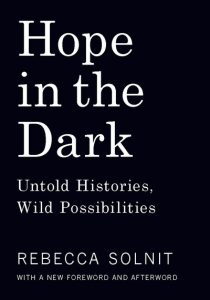

So, for example, early on you have this passage: But this book was written in 2005, just after Bush was reelected (remember those halcyon days when George fucking W was the worst Republican we could fathom?!), to bolster progressives in the face of the War on Terror and its associated awfulnesses. Those are unquestionably great, great moments, beautiful confluences where, by luck or chance or design, people came together to make great strides. To clarify my point, though: This is a series of essays about people power and direct action and quiet revolutions and radical upheavals, from Seattle to Bolivia to Berlin, from the Zapatistas to the WTO strikes to the fight for marriage equality.

But if it works for you, please, by all means, grab it and hold on tight.

For me, personally, I found this to be the absolute wrong moment to read it, because right now, having hope is not something I feel capable of. I cannot recommend strongly enough that you follow her on FB, where she is in the midst of a tireless campaign of resistance, deligitimizing our Horror-in-Chief, and spreading action steps so we can all do the same.Īnd I'm editing this part of my review, because I do not wish to stop anyone from either reading this book or from feeling hope in general in these harrowing times.

I'm a big fan of Rebecca Solnit - deep and moving essayist, unapologetic feminist and activist, inventor of the term "mansplaining," all-around brilliant gal. A product of the California public education system from kindergarten to graduate school, she is a columnist at the Guardian and a regular contributor to Literary Hub. Her forthcoming memoir, Recollections of My Nonexistence, is scheduled to release in March, 2020. Writer, historian, and activist Rebecca Solnit is the author of more than twenty books on feminism, western and indigenous history, popular power, social change and insurrection, wandering and walking, hope and disaster, including Call Them By Their True Names (Winner of the 2018 Kirkus Prize for Nonfiction), Cinderella Liberator, Men Explain Things to Me, The Mother of All Questions, and Hope in the Dark, and co-creator of the City of Women map, all published by Haymarket Books a trilogy of atlases of American cities, The Faraway Nearby, A Paradise Built in Hell: The Extraordinary Communities that Arise in Disaster, A Field Guide to Getting Lost, Wanderlust: A History of Walking, and River of Shadows: Eadweard Muybridge and the Technological Wild West (for which she received a Guggenheim, the National Book Critics Circle Award in criticism, and the Lannan Literary Award).


 0 kommentar(er)
0 kommentar(er)
